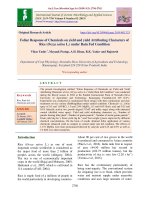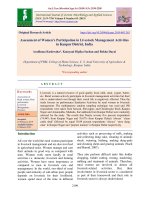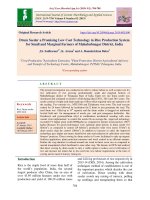Success cases of rice farmers under RKVY scheme at DAATTC, ranga reddy district India
Bạn đang xem bản rút gọn của tài liệu. Xem và tải ngay bản đầy đủ của tài liệu tại đây (319.25 KB, 6 trang )
Int.J.Curr.Microbiol.App.Sci (2018) 7(11): 2455-2460
International Journal of Current Microbiology and Applied Sciences
ISSN: 2319-7706 Volume 7 Number 11 (2018)
Journal homepage:
Case Study
/>
Success Cases of Rice Farmers under RKVY Scheme at DAATTC,
Ranga Reddy District India
N. Praveen1*, P. Ammaji2, C.H. Chiranjeevi3 and J.S. Sudharani2
1
(Agril. Extension) & Coordinator, 2Crop Production, and 3Plant Protection
District Agricultural Advisory and Transfer of Technology Centre, PJTSAU Telangana, India
*Corresponding author
ABSTRACT
Keywords
Rice farmers,
RKVY scheme,
Biointensive pest
management
Article Info
Accepted:
18 October 2018
Available Online:
10 November 2018
Rashtriya Krishi Vikas Yojana is a State Plan Scheme of Additional Central
Assistance launched in August 2007 as a part of the 11th Five Year Plan by
the Government of India under National Development Council, to achieve 4% annual
growth in agriculture through development of Agriculture and its allied sectors. A fund of
Rs 4,09090/- was allocated to DAATTC, Ranga Reddy PJTSAU during 2012-2014 for
organizing onfarm testing, Farmers training programmes and exposure visits. Farmers of
Ranga Reddy District cultivate rice in a larger area as major food crop. To enhance the
yields by adopting five improved technologies. i.e. Direct sowing with 8 row drum seeder
resulted on 9.5% increased yields 6451 kg/ha are normal sowing 5890 kg/ha. JGL 1118
variety has recorded 6698 kg/ha of yield when compared to 6147 kg/ha when normally
sown. Line planting of Rice seedlings, given an average yield of 6343 kg/ha as against
normal planting (5416 kg/ha).The intervention gave 14.6% increase in yield when
compared to normal planting.(SRI) System of Rice Intensification, SRI cultivation
recorded an average yield of 6266 kg/ha where has normal planting has recorded 5226
kg/ha. Biointensive pest management, BIPM has also recorded 2351 kg per acre against
1944 kg/arced in farmers practice, showing that the BIPM will be useful to the farmers in
reducing pest incidence and getting higher yields in Rice. Use of Liquid biofertilizers,
resulted effective tillers per hill (33.4/hill), more percent of filled grain per panicle (86%)
and more yield 2480 kg/ac with 1.55 CB ratio.
Introduction
Rashtriya Krishi Vikas Yojana is a State Plan
Scheme
of
Additional
Central
Assistance launched in August 2007 as a part
of the 11th Five Year Plan by the Government
of India under National Development Council,
to achieve 4% annual growth in agriculture
through development of Agriculture and its
allied sectors. A fund of Rs 4,09090/- was
allocated to DAATTC, Ranga Reddy PJTSAU
during 2012-2014 for organizing onfarm
testing, Farmers training programmes and
exposure visits. As farmers of Ranga Reddy
District cultivate rice in a larger area as major
food crop. To enhance the yields by adopting
five improved technologies. i.e. Direct sowing
with 8 row drum seeder, Line planting of Rice
seedlings,
(SRI)
System
of
Rice
Intensification, Biointensive pest management
and Liquid biofertilizers. as on farm testing
were grounded in the district i.e. were
2455
Int.J.Curr.Microbiol.App.Sci (2018) 7(11): 2455-2460
grounded in 25 beneficiaries of 11 mandals at
Ranga Reddy District.
The impact of few success cases under
RKVY scheme is presented below
Direct sowing with 8 row drum seeder
In Ranga Reddy district labour availability
during transplanting season is a major
constraint. Not only for transplanting the other
operations like weeding, harvesting etc also
require more labours. In order to overcome the
major limiting factor of labour in Paddy
cultivation, the drum seeder sowing was
introduced to Ranga Reddy district farmers by
DAATTC, Gudimalkapur under RKVY
programme (Table 1).
to 6147 kg/ha when normally sown. The
varieties recorded 22 average tillers/hill with
265 grains /panicle. JGL 17004 variety has
recorded an average yield of 6204 kg/ha when
sown with 8 row drum seeder and 5686 kg/ha
with normal sowing. This variety has recorded
18 tillers/hill and 275 grains/panicle (Table 2).
Advantages
Crop comes to harvest 7-10 days when
compared to transplanted rice.
Sowing of labours and reduction in cost of
cultivation on nursery management is skipped.
Labour cost is further reduced with the usage
of pre and post emergence weedicides.
Average yields (kg/ha) also increased by 9.5%
Disadvantages
“8” row drum seeder was used for sowing of
two Paddy varieties JGL -17004 and JGL1118 in 8 locations. For sowing with 8 row
drum seeder, the seed was pre soaked for 24
hours followed by incubation for12 hours to
just germinate the seed. The seed drum of the
drum seeder will be filled up to ¾ th capacity
and the drum seeder is dragged on uniformly
leveled per watered field for the management
of weeds, pre and post emergence weedicides
were
recommended.
Pre
emergence
weedicides like Oxadiarzyl was applied to
control the weeds. But phytotoxic symptoms
were noticed when field was not properly
tilled.
Due to severe cold and low temperatures,
germination was delayed by 7-10 days
resulting in early emergence of weed. In the
management of these weeds post emergence
weedicides like Nominee gold @ 80-100gr/Ac
was recommended.
Sowing with “8” row drum seeder resulted on
9.5% increased yields 6451 kg/ha are normal
sowing5890 kg/ha. JGL -1118 variety has
recorded 6698 kg/ha of yield when compared
Severe cold and low temperature conditions
may enhance the time for germination.
If rains occur within 12hours after sowing, the
seed gets disturbed.
Farmers are facing marketing problem as the
millers are objecting that the grains are
breaking during milling.
Line planting of rice seedlings
Evaluation of line planting was done in four
locations in Doma mandal and village of
Ranga Reddy district with variety JGL 1118
during 2012-13 Rabi season.15-20 deep old
Paddy seedlings were transplanted with a
spacing of 20cm between the line.1-2
seedlings were planted per hill. In this method
also Cono weeder was used on one side to
reduce for weeds. Recommended N, P, K
fertilizers were applied as per university
recommendations. Line planting intervention
has given an average yield of 6343 kg/ha as
against normal planting (5416 kg/ha).The
intervention gave 14.6% increase in yield
when compared to normal planting (Table 3).
2456
Int.J.Curr.Microbiol.App.Sci (2018) 7(11): 2455-2460
System of Rice Intensification (SRI)
early than normal planted Paddy.
Evaluating of SRI method of Paddy
cultivation with 15-17 days old seedling
instead of 8-10 days old seedling was done in
4 locations of Doma and Parigi mandals. MTU
1010 variety was used as test variety which is
of 120 days duration (Table 5).
Advantages
Trans planting was done with 15-17 days old
seedlings, at a spacing of 20cm and 1-2
seedlings per hill. Cono weeder was used to
suppress the weeds for 3-4 times.
Recommended N,P,K was applied as per
university recommendations.
The variety MTU 1010 gave 6.5% more yield
with SRI transplanting when compared to
normal planting. SRI cultivation recorded an
average yield of 6266 kg/ha where has normal
planting has recorded 5226 kg/ha. SRI
transplanted Paddy came to harvest 7-10 days
Crop came to harvest 5-7 days early than
normal planting.
Less seed rate (2-3 kg/ac) when compared to
normal planting.
Management of weed is easy as cono weeder
is used in SRI transplanting.
Gave more yield than normal planting.
SRI cultivation is being adopted by number of
farmers in Ranga Reddy district in Doma
mandal.
Disadvantages
Labour cost is more.
Availability of labours for line planting is the
major constraint.
Table.1 Details of 8 row drum seeder in rice
S.
No
Name of the
farmer
Village and
address
1
2
V. Ramesh
M.Ramchandr
a Reddy
M.Chandra
Reddy
M.Krishna
Reddy
Nageshwara
Rao
Doma (m & V) JGL-1118
Doma (m & V) JGL-1118
100
100
17-1-13
7-1-13
Date of
Yield, kg/ha
Harvesting
Demo Control
7-5-13
6180
5846
17-4-13
7050
6428
Doma (m & V) JGL-1118
120
5-1-13
27-4-13
6775
5887
Parepally(v)
Doma (m)
Haridaspally,
Keesara (m)
JGL-1118
120
17-1-13
6-5-13
6548
6120
JGL-1118
120
18-1-13
7-5-13
6940
6454
10-5-13
6698
6140
6147
5570
5-1-13
28-5-13
6387
5645
20-1-13
3-5-13
6085
6204
5686
5633
3
4
5
6
Md.Kursheed
7
R.Satti Reddy
8
G.Vijay Rao
Variety
Duration Date of
sowing
Total average
JGL-17004 120
17-1-13
Haridaspally,
Keesara (m)
Cheryal,
JGL-17004 120
Keesara (m)
Doma (m & V) JGL-17004 100
Total average
2457
Int.J.Curr.Microbiol.App.Sci (2018) 7(11): 2455-2460
Table.2 Growth and yield attributes of JGL-1118 and JGL-17004
JGL-1118
22
93
24
265
Tillers / hill
Plant height (cm)
Panicle length (cm)
Grains/panicle
JGL-17004
18
95
23
275
Table.3 Details of line planting of rice seedlings
S.
No
Name of the
farmer
Village and
address
Variety
Duration Date of
sowing
Date of
Harvesting
Yield, kg/ha
Parepally(v)
Doma (m)
JGL-1118
120
14-1-13
5-5-13
Demo
6015
K Rami Reddy
Doma (m & V)
JGL-1118
120
15-1-13
7-5-13
6425
5185
3
K. Krishna Reddy
Doma (m & V)
JGL-1118
120
15-1-13
8-5-13
6656
5285
4
K. Dasthaiah
Doma (m & V)
JGL-1118
100
15-1-13
10-5-13
6275
5760
6342.75
5416.25
1
S.Sanjeev
2
Avg
Control
5435
Table.4 Details of bio intensive pest management
S.No
Name of
Location/
Farmer
G. Narayana Rao
Gaddipalli (v)Darur(m)
B. Ramulu Gaddipally
2
(v)Darur (m)
C.Yadaiah Gaddipally(v)
3
Darur(m)
K.Rajender Gollapally(v)
4
Darur(m)
K.Bakka Reddy
5
Gaddipally(v)
Darur(m)
Average
1
White ears
(from 20 randomly
selected plants)
BIPM
FP
2
5
BIPM
6144
4440
BIPM
FP
2.05
1.27
2
4
5328
4236
1.78
1.21
1
6
5628
4884
1.88
1.40
3
7
5268
4668
1.76
1.33
2
5
5844
5100
1.95
1.46
10
27
5642.4
4665.6
1.88
0.67
2458
Yield/acre
FP
CB Ratio
Int.J.Curr.Microbiol.App.Sci (2018) 7(11): 2455-2460
Table.5 Details of system of rice intensification
S.
No
1
2
3
4
Name of the
Village and address
farmer
Satyanarayan
Doma (m & V)
reddy
Prabhulingam Parepally(v) Doma (m)
S.Sanjeev
Parepally(v) Doma (m)
C.Yadaiah
Gaddipally(v)Darur(m)
Avg
Variety
Duration
MTU-1010
100
Date of
Date of
Yield, kg/ha
sowing Harvesting Demo
Control
16-1-13
30-4-13
6145
5685
MTU-1010
MTU-1010
MTU-1010
100
120
120
17-1-13
14-1-13
15-1-13
30-4-13
6-5-13
7-5-13
6585
5875
6461
6266.5
5945
5265
5210
5526.25
Table.6 Details of liquid biofertilizers
Treatments
No.
tillers
per hill
Percentage of
filled grains per
panicle
Grain Yield
per
Cost
Benefit
ratio
28
45
37
No. of
effective
tillers per
hill
23
38
32
Farmer’s Practice
Liquid Bio-fertilizers with 75% RDF
100% RDF
86
85
75
5040
6360
5616
1:1.21
1:1.62
1:1.30
Avg
36.6
31
87
5672
1:1.37
*RDF: Recommended dose of fertilizer
useful to the farmers in reducing pest
incidence and getting higher yields in Rice.
Biointensive pest management
The trial on Bio intensive pest management
along with farmers practice was conducted in
„5‟ location in Dharur Mandal. In bio
intensive pest management the components
like Tirchocards, Pheromone traps were used
where as in farmers practice no components
were added (Table 4).
Regarding the pest incidence, low incidence
of stem borer (dead hearts), leaf folder, Rice
skipper, caseworm and hairy caterpillar were
noticed during the crop growth period. No
sucking pests were observed. Very low
infestations of white ears were noticed at the
time of harvest. An average of 0.5 white
ears/will were recorded in BIPM where as
1.35 white ears/hill were recorded in farmers
practice. BIPM has also recorded 2351 kg per
acre against 1944 kg/arced in farmers
practice, showing that the BIPM will be
Liquid biofertilizers
The trial was conducted in 5 locations in
villages of Ranga Reddy, Ibrahimpatnam and
Doma mandals out of three treatments
evaluated, application of liquid bio fertilizer
along with 75% of RDF gave more number of
tillers/hill (39.6/hill) more number of
effective tillers per hill (33.4/hill), more
percent of filled grain per panicle (86%) and
more yield 2480 kg/ac with 1.55 CB ratio.
The treatment with 100% RDF has reduced a
CB ratio of 1.30 and farmers practices has
given 1.21 CB ratio (Table 6).
The activities taken up and implemented used
under RKVY scheme helped the farming
2459
Int.J.Curr.Microbiol.App.Sci (2018) 7(11): 2455-2460
community in many folds. The success stories
documented on the impact of Direct sowing
with 8 row drum seeder, Line planting of Rice
seedlings,
(SRI)
System
of
Rice
Intensification, Biointensive pest management
and Liquid biofertilizers. As on farm testing
were grounded in the district i.e. were
grounded in 25 beneficiaries of 11 mandals at
RangaReddy District. Motivated the other
farmers to adopt the same.
References
Rashtriya Krishi Vikas Yojana 2014:
Operational guidelines for XII five year
plan Department of Agriculture and
Cooperation, Ministry of Agriculture,
Government of India.
Annual progress reports DAATTC, Ranga
Reddy PJTSAU during 2013-2014,
2014-2015 and 2015-2016.
How to cite this article:
Praveen, N., P. Ammaji, C.H. Chiranjeevi and Sudharani, J.S. 2018. Success Cases of Rice
Farmers under RKVY Scheme at DAATTC, Ranga Reddy District, India.
Int.J.Curr.Microbiol.App.Sci. 7(11): 2455-2460. doi: />
2460









